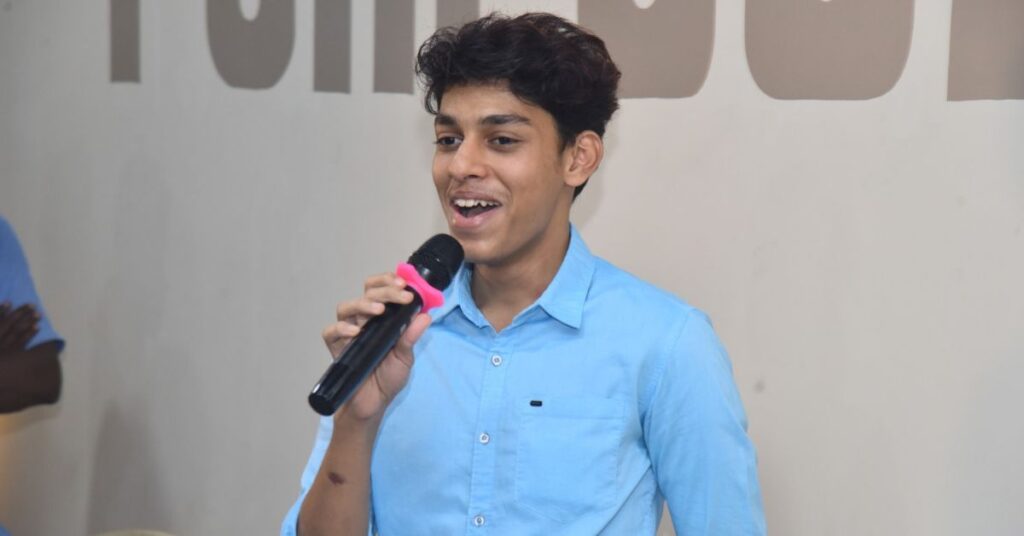At just 19 years old, Mahmood Akram from Chennai has achieved what many consider impossible. With the ability to read, write, and type in 400 languages and speak 46 fluently, his journey speaks volumes about his passion for learning languages.
Mahmood’s achievements have earned him world records, awards, and the respect of linguists around the world. His story is not just about his success but also about appreciating the diversity of languages that bring people together.
A linguistic journey
Akram’s fascination with languages began early, guided by his father, Shilbee Mozhippriyan, who himself speaks 16 languages. “I had struggled because I did not know the language of a particular state or country when I had to move to places like Israel, Spain, due to my job,” shares Shilbee, who also owns a doctorate in cognitive psychology among other degrees.
“I did not want my son to be snatched away from opportunities based on language. When my wife was conceived with Akram, we had conversations about languages in hopes that they would help to pique the baby’s interest. It seems to have worked in Akram’s case,” Shilbee adds.
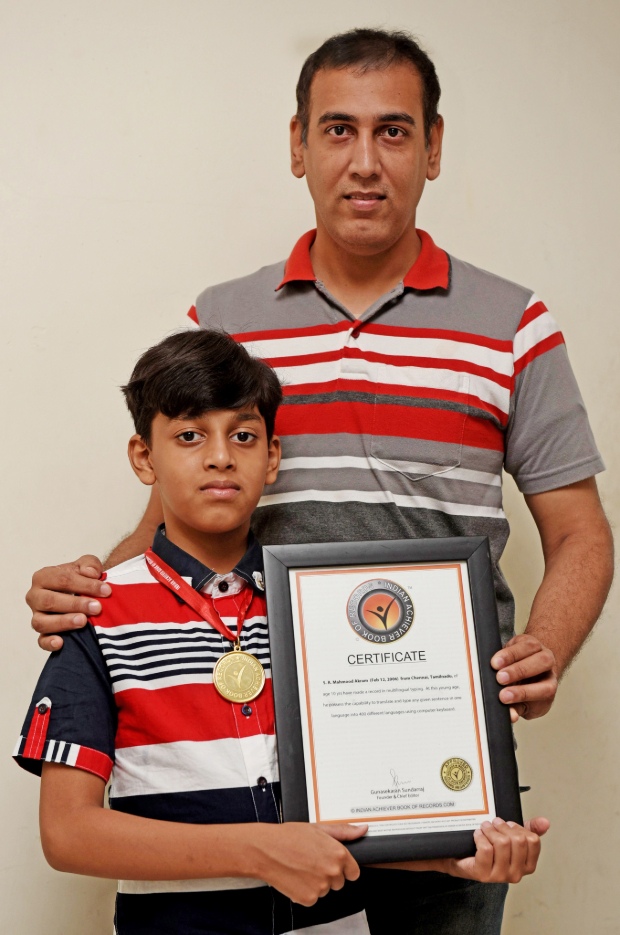
As Akram recalls, “My journey started at the age of four.” “My parents began teaching me Tamil and English alphabets, and I mastered the English alphabet in six days. They were astonished.” His aptitude didn’t stop there. He learnt the 299 alphabets of Tamil in just three weeks, a task that typically takes months.
His father’s guidance introduced him to ancient Tamil scripts like Vatteluttu, Grantha, and Tamizhi, which Akram quickly mastered. “By the time I was six, I had surpassed my father’s knowledge and wanted to explore more languages on my own.”
Achievements and records
Between the ages of six to eight, Akram’s self-driven quest for linguistic mastery led him to learn 50 languages. “Back in the day, I had to rely on a few textbooks and Omniglot to learn different languages,” says Akram. Omniglot is an online encyclopedia for writing and reading languages.
This journey led to his first world record as the youngest multilingual typist at just eight years of age. “I uploaded a video on YouTube, typing and reading different languages. A world record organisation in Punjab invited me to attempt a record, which I successfully completed,” he recalls.
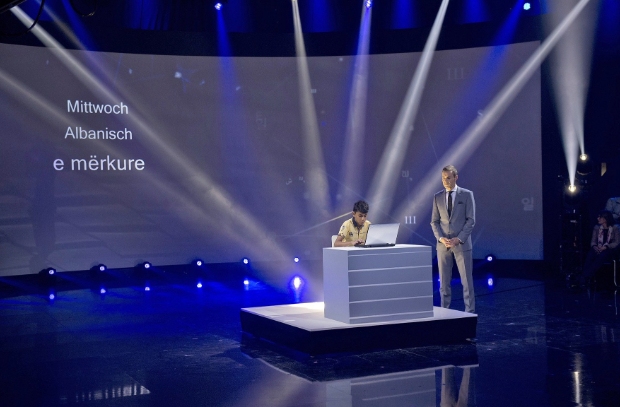
At 10, Akram achieved his second world record by writing the Indian national anthem in 20 languages within an hour. His hunger for linguistic excellence continued, and by 12, he could read, write, and type in 400 languages! He earned his third world record in Germany, competing against 70 linguistic experts.
“We had to translate a sentence into as many languages as we could within three minutes. I won the Germany Young Talent Award for translating the most. Even the experts could not keep up with my speed,” Akram shares proudly.
Challenges in education
As Akram’s passion for languages grew, it posed challenges to his conventional education. He studied in Chennai until the fifth grade but soon realised his passion required a different approach. “I wanted to attend a school focused only on languages, but I couldn’t find one in India. I ended up studying online with a school in Israel, learning mainstream languages like Arabic, Spanish, French, and Hebrew.”
Despite his success, he admits to having realised the importance of academic certificates in life and how they can sometimes matter more than talent.
“When I wanted to join a regular school, no one in India accepted me. They insisted I start again from the sixth grade. So I decided to study through the National Institute of Open Schooling and cleared my exams that way,” says Akram.
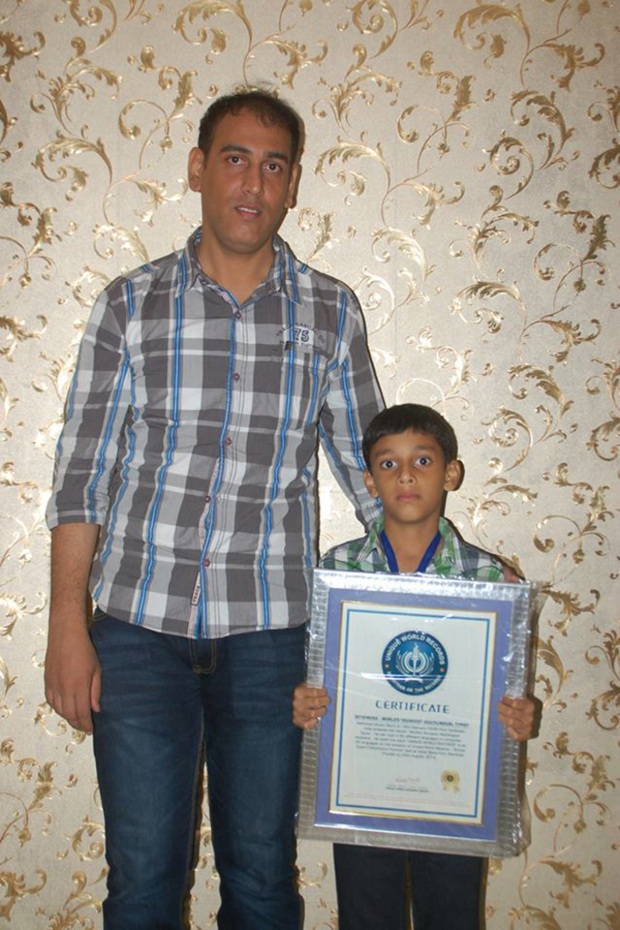
He participated in the talent show, and received an opportunity to complete his schooling in any European country. “I started high school at Danube International School in Vienna, Austria, on a scholarship,” says Akram. This experience allowed him to converse with native speakers and enhance his linguistic skills. “In my classroom alone, there were 39 nationalities. Conversing with my classmates helped me become fluent in many languages,” he explains.
Today, Akram is pursuing multiple degrees: linguistics from the Open University in Milton Keynes, UK, a BA in English Literature, and a bachelors in science in Animation from Alagappa University, Chennai. “Since I have been learning languages, I don’t have to prepare or learn anything for both my linguistics and the literature degree,” says Akram, which makes it easier to manage the degrees.
“I mostly go to Alagappa University for my exams, and when they want me to attend classes,” Akram shares.
“Languages are my talent, but animation is my interest,” he says with a laugh. “I am also interested in singing, but my voice says otherwise.”
The art of speaking
Akram’s journey evolved as he recognised the importance of speaking languages fluently. “Until I was 14, I could only say random phrases like ‘hello’ or ‘good morning’ in most languages,” Akram admits.
Today, he is fluent in 15 languages and continues to master the others to the level of a near-native speaker. “It’s one thing to read and write, but speaking a language requires understanding the dialect and pronunciation,” he adds.
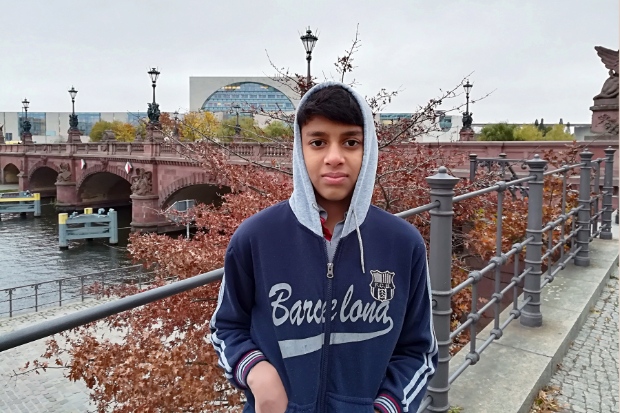
He also uses social media and entertainment to keep in touch with the numerous languages he has learnt over the years. “I sometimes change my social media language to Russian, I watch YouTube shorts in Danish and Facebook videos in Arabic,” Akram adds.
Among the languages he has mastered, Tamil remains his favourite. “It’s my mother tongue and holds a special place in my heart. Japanese was surprisingly easy for me because its grammar and pronunciation resembled Tamil. On the other hand, languages like Czech, Finnish, and Vietnamese were the hardest for me to master.”
A mission beyond records
For Akram, his achievements are part of a bigger goal. “In Tamil Nadu, many believe English is enough for global communication. I want to change that and encourage people to learn more languages,” he says.
In 2016, Shilbee founded the Akram Global Languages Institute in Shenoy Nagar, Chennai. “I felt that it was selfish on my part to teach languages only to my son. I wanted others to benefit from the power of languages,” shares Shilbee.
The institute offers both online and offline classes to students from India and countries like the Gulf, Europe, and Australia, teaching at least 150 students each month.
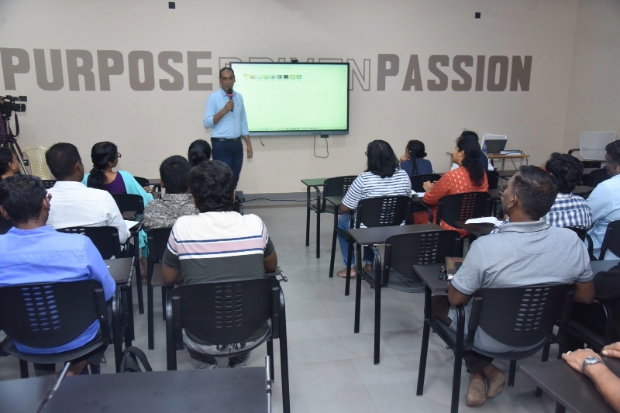
“We teach students based on their requirements; some would just want to speak the language, while others would learn to clear exams required for visa and green card purposes,” Shilbee says.
While Shilbee and his wife, Aminal Begum, were initially the main teachers, Akram joined as a teacher at 14 after his YouTube subscribers encouraged him. “I had to first learn how to teach since I had self-studied most of the languages,” Akram recalls.
As his teaching methods gained popularity, many students began expressing their appreciation for the approach.
“When I was pregnant, I decided to learn languages from Akram Institute. I like the method of teaching that they follow. The cost of the classes seem affordable to me,” shares Malligavathy M, who has learned Hindi, French, Spoken English, American accent and Telugu through online classes conducted by Shilbee and Akram.
His popularity grew, and by 2024, he was teaching abroad, conducting language workshops in Myanmar, Cambodia, Thailand, and Indonesia, at schools and colleges.
“We teach languages based on what the students wish to learn. It’s easier because I often know their mother tongue,” he explains. Plans are underway to expand this initiative to countries like China and South Korea where the citizens do not fluently speak English.
Connecting hearts through languages
For Akram, learning languages is about more than communication; it’s about connection. “If I speak in your native language, you’ll respond with your heart. But if I use English, you’ll speak with your brain. That’s the motivation behind learning all these languages.”
His dream is to translate Tamil literary treasures like Thirukkural and Tholkappiyam into as many languages as possible. “Only people speaking 50 languages can currently access Thirukkural. I want the global audience to know Tamil’s rich heritage.”
A polyglot’s routine
Balancing this mastery, education, and teaching is no small feat. Akram relies on a structured routine, dedicating his mornings to practising languages. “I wake up at 5 am to practise languages for two hours every day, as my brain gets most oxygen,” shares Akram.
“I revise languages by reading comic books and watching films. I have an Excel sheet where I take one particular vocabulary and see if I can write it in all the languages that I know,” quotes Akram. Post that he goes ahead with his day, sorting out the work from his multiple degrees if any. He dedicates his evenings towards teaching both online and offline.
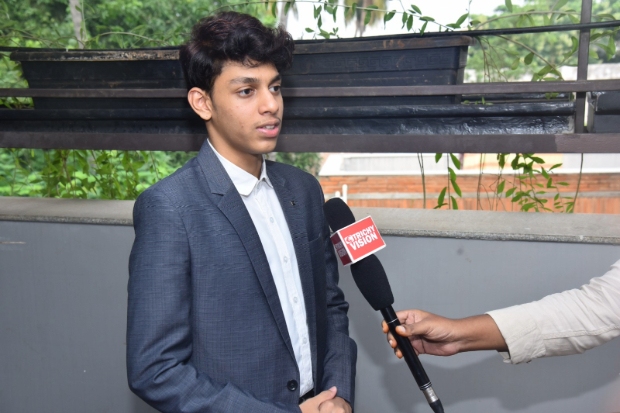
“Since I primarily deal with people learning from abroad, my classes extend in the night due to the time difference and feasibility of the student,” Akram adds. His love for languages helps him balance his role as a student and teacher effectively.
He credits his parents for nurturing his talent. “Talent lies within the individual, but it’s up to parents or teachers to recognise and support it. If not for their encouragement, I might have stopped at 16 languages.”
From a curious four-year-old learning alphabets in Chennai to a world record-holding polyglot, Mahmood Akram’s journey is a powerful reminder of the impact of passion and perseverance.
Akram hopes his work will inspire others to appreciate linguistic diversity. “I want to be a language professor at a renowned university and a role model for others. Knowing a language is a powerful way to make people feel at home.”
Edited by Megha Chowdhury. All images: Mahmood Akram

